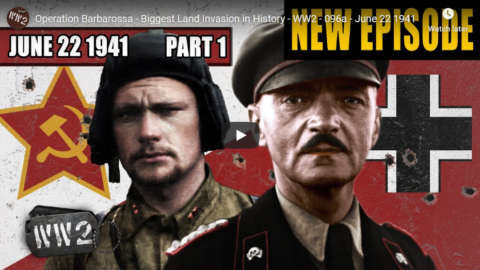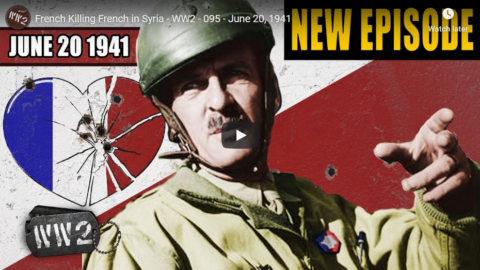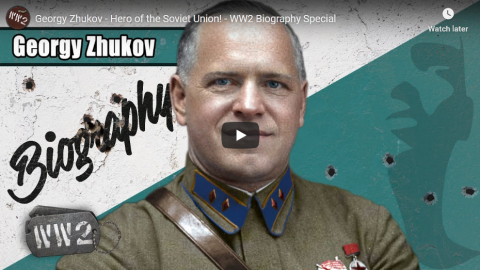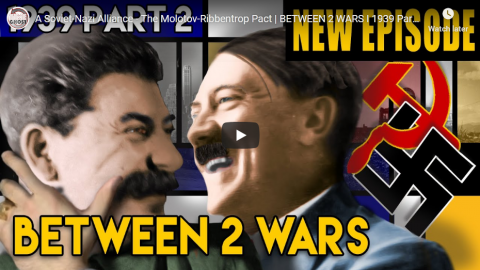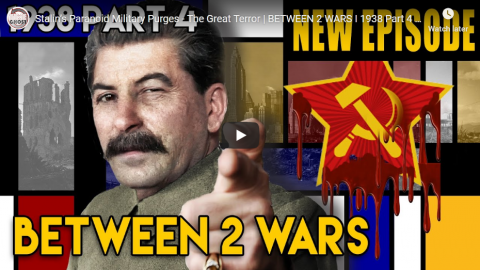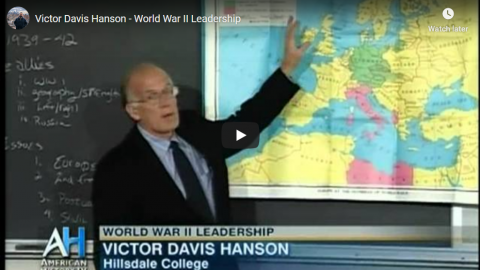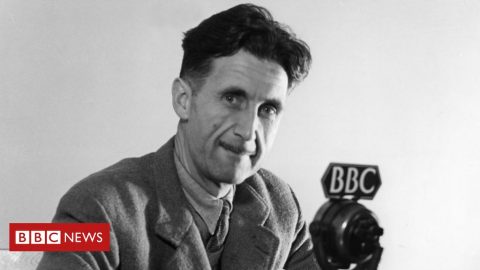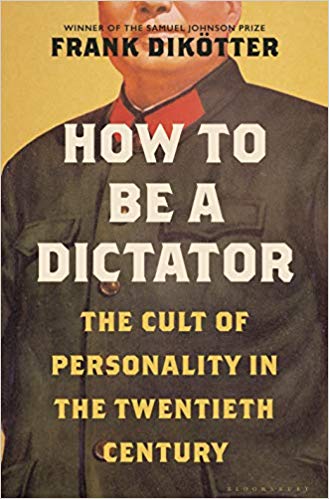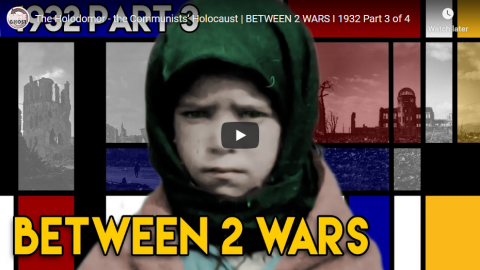World War Two
Published 22 Jun 2020June 22 1941. The first day of Operation Barbarossa begins as Adolf Hitler’s German armies invade Joseph Stalin’s Soviet Union with the largest force on the longest front ever seen in human history…
Join us on Patreon: https://www.patreon.com/TimeGhostHistory
Or join The TimeGhost Army directly at: https://timeghost.tvLinks Indy mentioned:
Special episode on the tanks of Barbarossa – https://youtu.be/gh7mt2OS770
Special episode on trucks and Barbarossa logistics – https://youtu.be/4lSCnOltYdY
Special episode about Blitzkrieg tactics – https://youtu.be/qej9DX28-xwFollow WW2 day by day on Instagram @World_war_two_realtime https://www.instagram.com/world_war_two_realtime
Between 2 Wars: https://www.youtube.com/playlist?list…
Source list: http://bit.ly/WW2sourcesWritten and Hosted by: Indy Neidell
Director: Astrid Deinhard
Producers: Astrid Deinhard and Spartacus Olsson
Executive Producers: Astrid Deinhard, Indy Neidell, Spartacus Olsson, Bodo Rittenauer
Creative Producer: Joram Appel
Post-Production Director: Wieke Kapteijns
Research by: Indy Neidell
Edited by: Iryna Dulka
Sound design: Marek Kamiński
Map animations: Eastory (https://www.youtube.com/c/eastory)Colorizations by:
– Olga Shirnina, a.k.a. Klimbim – https://klimbim2014.wordpress.com/
– Julius Jääskeläinen – https://www.facebook.com/JJcolorization/
– Norman Stewart – https://oldtimesincolor.blogspot.com/
– Jaris Almazani (Artistic Man), https://instagram.com/artistic.man?ig…
– Dememorabilia – https://www.instagram.com/dememorabilia/Sources:
– Mil.ru
– Bundesarchiv, CC-BY-SA 3.0: Bild_146II-277,
– RIA Novosti archive, CC-BY-SA 3.0: image 613694, Shagin
– F l a n k e r from Wikimedia
– The Al Goldstein collection in the Pandora Music repository at ibiblio.org.
– Les Préludes, Poema sinfonico n°, Franz List and Herbert von Karajan (dir), CC BY-NC-SA 4.0. Via Marco Calvo, http://www.marcocalvo.it/Archive by Screenocean/Reuters https://www.screenocean.com.
A TimeGhost chronological documentary produced by OnLion Entertainment GmbH.
June 23, 2020
June 21, 2020
May 14, 2020
Three reasons the Western allies fail to fully acknowledge the efforts of the Soviets in WW2
Arthur Chrenkoff suggests three major reasons for why many Russians and other Soviet-nostalgics feel the west is wrongly denying the Soviet Union full credit for the defeat of Nazi Germany:
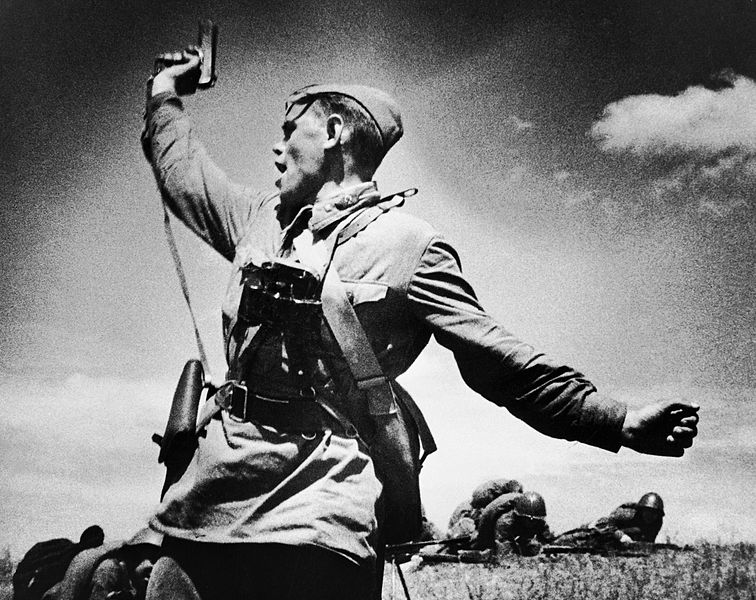
Kombat (Russian: Комбат, lit. “battalion commander”) is a black-and-white photograph by the Soviet photographer Max Alpert. It depicts a Soviet military officer armed with a TT pistol who is raising his unit for an attack during World War II. This work is regarded as one of the most iconic Soviet World War II photographs, yet neither the date nor the subject is known with certainty. According to the most widely accepted version, the photograph depicts junior politruk (political officer) Aleksei Gordeyevich Yeryomenko, minutes before his death on 12 July 1942, in Voroshilovgrad Oblast, Ukraine.
Wikimedia Commons.
But while the Russian – or, more correctly, Soviet – role in defeating Hitler is beyond question and deserves wider attention and recognition, there are several reasons why the Western acknowledgement of the eastern front will always remain qualified and somewhat ambiguous.
Firstly, while Russia continues to variously deny, downplay or excuse the fact, the Soviet Union was the initial co-aggressor in World War Two and for the first two years a Nazi ally and collaborator. Stalin might have had legitimate realpolitik reasons for the Ribbentrop-Molotov pact, in effect sacrificing Europe to win more time to prepare for the inevitable war with Germany (nice in theory, the gambit in any case did not work out in practice), but the fact remains that in concert with Hitler, Stalin invaded Poland and was rewarded with its eastern half, subsequently also helping himself to Bessarbia, annexing the Baltic states and invading Finland. In turn, the fact that Hitler assured himself he would not be facing a war on two fronts, which doomed Germany in World War One, allowed him to successively snatch Poland, Norway, Denmark, the Netherlands, Belgium, France, Yugoslavia and Greece, giving Germany a complete dominance over the continental Europe from the Atlantic to the Bug river and the Arctic Circle to Crete. And while Great Britain stood alone against Germany for a year from mid-1940 to mid-1941, Soviet resources and produce kept flowing in, feeding and arming the Nazi monster. This makes Stalin’s subsequent anger over the Allied delay in launching the Second Front in the West quite hypocritical – where was the Second Front in the East while Luftwaffe was blitzing Britain and its troops were battling Italians and Rommel in north Africa?
Secondly, without in any way diminishing the German barbarity in the east, a significant proportion of the Soviet military and civilian casualties were unnecessary and resulted from the communist government’s complete and utter disregard for the lives and well-being of its subjects. Stalin fought the war as he fought the peace at home. The man who prior to 1941 had managed to send somewhere upwards of 15 million of his own people to an early grave, clearly wasn’t going to spare the long suffering population when faced with an external existential threat. The Soviet Union might not have (at least initially) had much else, but it certainly had people, and they were sacrificed in obscene numbers by the man in the Kremlin and his minions on the ground. For most of the war, several Red Army soldiers were dying for every one German, while obeying absurd orders to stand ground or frontally attack in total disregard for the local circumstances or for that matter any reasonable tactical and strategic consideration. When Eisenhower and Zhukov caught up some time later in the war and the conversation turned to the best method of clearing mine fields, the Russian astonished the Allied Commander-in-Chief when he nominated simply sending the infantry through as the easiest and the cheapest method. This wasn’t a joke either; it was the way the Red Army fought from the first days of Barbarossa all the way to Berlin, even though the eventual overwhelming material superiority did save many an Ivan’s life in the later stages of the conflict. Not enough, however, to wipe out the entire generation of men born in the mid-1920s.
Thirdly, while the Red Army did indeed end the brutal Nazi occupation of the Central and the Eastern Europe, it did not bring freedom in any meaningful sense of the word, except perhaps (in most cases) freedom from sudden death. Debates about similarities and differences between the two totalitarian systems will no doubt continue well into the future. Unquestionably, for an average Slav, the Soviet domination was a better option that the Nazi one. Nazis, by and large, considered Slavs to be subhuman (though making some allowances, often quite significant, for their Slavic allies, like the Slovaks, the Croats or the Bulgarians), fit only to be initially enslaved and eventually exterminated. This was the far deadlier and much more ideological continuation of Germany’s 1000-year “drang nach osten” or the “civilising” mission to expand into the fertile east. Particular hatred was reserved for the Poles, who stood as a barrier for most of that millennium, preventing the dream of lebensraum from being realised. Russia was a much more recent enemy, having overlaid its Slavic barbarity with a Bolshevik malignancy. Even the initial Nazi plans called for starving between 25-30 million Belorussians, Ukrainians and Russians in order to free up food and resources for Germany. Communists could be deadly too, of course, and both the Reds and the Blacks were fond of decimating the local elites and intelligencia, but the Soviets at least did not see their Slavic brethren as subhumans but as proletarian masses to be converted to the glories of Marxism-Leninism.
Be that as it may, the Soviet liberation did not bring liberty or independence to the people of Eastern Europe. That had to wait until 1989-91.
May 6, 2020
Georgy Zhukov – Hero of the Soviet Union! – WW2 Biography Special
World War Two
Published 5 May 2020Georgy Zhukov’s rise to one day become the Hero of the Soviet Union did not happen overnight. Instead, the son of a poor tradesman has slowly worked himself up the ranks of the Red Army using his grit, determination, and iron will.
Join us on Patreon: https://www.patreon.com/TimeGhostHistory
Or join The TimeGhost Army directly at: https://timeghost.tvFollow WW2 day by day on Instagram @World_war_two_realtime https://www.instagram.com/world_war_t…
Between 2 Wars: https://www.youtube.com/playlist?list…
Source list: http://bit.ly/WW2sourcesHosted by: Indy Neidell
Written by: Francis van Berkel
Director: Astrid Deinhard
Producers: Astrid Deinhard and Spartacus Olsson
Executive Producers: Astrid Deinhard, Indy Neidell, Spartacus Olsson, Bodo Rittenauer
Creative Producer: Joram Appel
Post-Production Director: Wieke Kapteijns
Research by: Francis van Berkel
Edited by: Mikołaj Cackowski
Sound design: Marek Kamiński
Map animations: Eastory (https://www.youtube.com/c/eastory)Colorizations by:
Carlos Ortega Pereira, BlauColorizations, https://www.instagram.com/blaucoloriz…
Jaris Almazani (Artistic Man), https://instagram.com/artistic.man?ig…
Olga Shirnina, https://klimbim2014.wordpress.com
Sources:
Mil.ru
Cross of Saint-George Issue for subaltern officers 1917, courtesy Robert Prummel
from the Noun Project: company soldiers by Andrei Yushchenko, ak 47 by TMDSoundtrack from the Epidemic Sound:
Reynard Seidel – “Deflection”
Johannes Bornlof – “The Inspector 4”
Johannes Bornlof – “Deviation In Time”
Rannar Sillard – “March Of The Brave 4”
Johannes Bornlof – “Death And Glory 2”
Phoenix Tail – “At the Front”Archive by Screenocean/Reuters https://www.screenocean.com.
A TimeGhost chronological documentary produced by OnLion Entertainment GmbH.
April 2, 2020
A Soviet-Nazi Alliance – The Molotov-Ribbentrop Pact | BETWEEN 2 WARS I 1939 Part 2 of 3
TimeGhost History
Published 1 Apr 2020In 1939, two bitter rivals sign a non-aggression pact. But the treaty is something more than just a simple pledge of neutrality. Nazi Germany and the Soviet Union have also secretly agreed on how they will carve up Eastern Europe between them.
Join us on Patreon: https://www.patreon.com/TimeGhostHistory
Hosted by: Indy Neidell
Written by: Francis van Berkel
Directed by: Spartacus Olsson and Astrid Deinhard
Executive Producers: Bodo Rittenauer, Astrid Deinhard, Indy Neidell, Spartacus Olsson
Creative Producer: Joram Appel
Post-Production Director: Wieke Kapteijns
Research by: Francis van Berkel
Edited by: Daniel Weiss
Sound design: Marek KamińskiSources:
Bundesarchiv_Bild:
102-14436, 146-1977-159-11, 146-1982-159-22A,
146-1997-060-33A, 183-2006-1010-502, 183-H27337,
183-H28422, 183-R09876, 183-R14433, 183-S52480, RH 2/2292,
Novosti archive, image #409024 / Vladimir GrebnevFrom the Noun Project:
killer with a gun By Arthur Shlain
guns by By Cards Against Humanity,
Shield By Laili Hidayati,Photos from color by klimbim.
Colorizations by:
– Owen Robinson – https://www.instagram.com/owen.colori…
– Dememorabilia – https://www.instagram.com/dememorabilia/Soundtracks from Epidemic Sound:
– “Last Point of Safe Return” – Fabien Tell
– “The Inspector 4” – Johannes Bornlöf
– “Easy Target” – Rannar Sillard
– “Split Decision” – Rannar Sillard
– “Death And Glory 1” – Johannes Bornlöf
– “First Responders” – Skrya
– “Disciples of Sun Tzu” – Christian Andersen
– “Mystery Minutes” – Farrell Wooten
– “Split Decision” – Rannar Sillard
– “Death And Glory 3” – Johannes Bornlöf
– “The Charleston 3” – Håkan ErikssonA TimeGhost chronological documentary produced by OnLion Entertainment GmbH.
From the comments:
TimeGhost History
1 day ago (edited)
If you didn’t think this topic is controversial enough already, we have an even more contentious question for you: Is the Soviet Union basically an Axis Power between 1939 and 1941?Technically the answer is a definite “no” because the USSR will never sign the Tripartite Pact, but it’s still worth thinking about. The USSR and Nazi Germany will cultivate a pretty productive relationship after they sign the Non-Aggression Treaty, not only prompting a joint occupation of Poland but also allowing Hitler to invade Western Europe without having to worry about his eastern borders. So when you look at it like that, the USSR directly supported the Nazi war machine. On the other hand, it is probably a bit of a leap to blame the USSR for Nazi expansionism, and Stalin is forced by circumstances to enter into the Pact. The USSR is not ready to fight a war at this point, and the treaty buys not only time but also space, creating a virtual buffer zone between Germany and the Motherland in the form of Poland. Cynical and calculated, yes, but that’s diplomacy for you. Stalin will obviously offer a very extreme interpretation of this second argument after the war, casting Soviet actions as a necessary defensive measure against the imperialism of the Western Powers and their supposed encouragement of Nazi Germany. Stalinist myth-making aside, the argument that defensive considerations is a significant factor in the Soviets signing of the Pact does have some merit.
This question is more than just an academic exercise. The USSR rightfully gets credit for bearing the brunt of the Nazi onslaught, but would we think differently about it as an Allied power if we also understood as a former Axis power? Let us know what you think below. Stay safe out there.
Cheers, Francis.
March 19, 2020
Stalin’s Paranoid Military Purges – The Great Terror | BETWEEN 2 WARS I 1938 Part 4 of 4
TimeGhost History
Published 18 Mar 2020In 1938, Stalin has his military leadership purged, and has thousands of his comrades killed or locked up. The reasons as to why he did it are still open for debate.
Join us on Patreon: https://www.patreon.com/TimeGhostHistory
Hosted by: Indy Neidell
Written by: Joram Appel
Directed by: Spartacus Olsson and Astrid Deinhard
Executive Producers: Bodo Rittenauer, Astrid Deinhard, Indy Neidell, Spartacus Olsson
Creative Producer: Joram Appel
Post-Production Director: Wieke Kapteijns
Research by: Joram Appel
Edited by: Daniel Weiss
Sound design: Marek KamińskiColorizations by:
– Daniel WeissSources:
From the Noun Project:
– Saluting Veteran by Eric Lamar Pearine
– Russian_soldier_1553396 (Edited) by Wonmo Kang
– Prison by FORMGUT
– Law_585610 by Delwar Hossain
Photos from Color by KlimbimSoundtracks from Epidemic Sound:
– “Split Decision” – Rannar Sillard
– “Last Point of Safe Return” – Fabien Tell
– “Watchman” – Yi Nantiro
– “Disciples of Sun Tzu” – Christian Andersen
– “The Inspector 4” – Johannes Bornlöf
– “Not Safe Yet” – Gunnar Johnsen
– “Death And Glory 1” – Johannes Bornlöf
– “Dark Beginning” – Johan Hynynen
– “First Responders” – Skrya
– “The Charleston 3” – Håkan ErikssonA TimeGhost chronological documentary produced by OnLion Entertainment GmbH.
From the comments:
TimeGhost History
1 day ago
This episode was hard to write, mainly because of the ambiguity that this topic is still clouded in today. There are no conclusive answers as to why Stalin did what he did, and why he stopped doing what he was doing in 1938. This episode features some of the explanations of the purges and the Great Terror. This certainly is a remarkable piece of Soviet History, and one that would dramatically influence the performance of the Red Army in 1939 and beyond. Those who followed our World War Two series know that already in December ’39, the direct consequences of the purges in ’37 and ’38 are gigantic. I would also like to note here that we would like the comment section to stick to factual debate.
cheers, Joram
February 7, 2020
Modern day Kremlinology and show trials
At Rotten Chestnuts, Severian explains why the Soviet Union’s Moscow Trials were so important well outside the borders of the USSR:
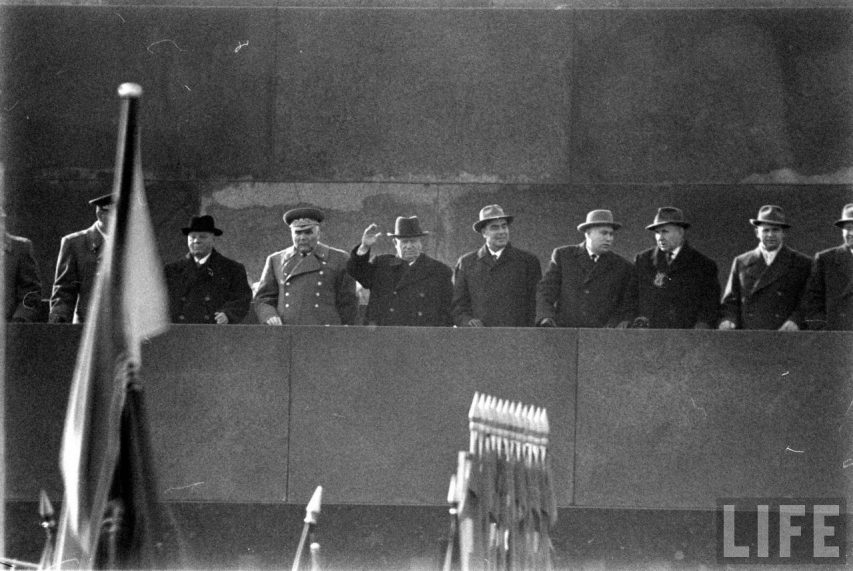
Krushchev, Brezhnev and other Soviet leaders review the Revolution parade in Red Square, 1962.
LIFE magazine photo by Stan Wayman.
It’s not much of an exaggeration to say that the Moscow Trials set the course of 20th century history. If you want to be a dictator in peacetime, this is pretty much how you have to do it — see e.g. every other Communist regime ever. The downside, though, is that you cost yourself a lot of irreplaceable technical expertise. I’m not saying Hitler would’ve called Barbarossa off if Stalin hadn’t purged all his generals — Hitler was, of course, crazy — but he surely would’ve thought twice about it, the plan relying as it did on the utter incompetence of the now-leaderless Red Army.
The show trials also gave birth to “Kremlinology”, the art and science of reading Soviet tea leaves to find out who’s really in charge. Stalin didn’t invent “elimination by promotion”, but he was a master of it. In Stalin’s USSR, being “promoted” to some big, important-sounding position was an all-but-guarantee that you’re going to get shot. Seemingly minor functionaries, on the other hand, really ran things in the countryside. E.g. Khrushchev, a Red Army commissar — not an unimportant position by any means, but hardly a glory post either. Stalin’s generals knew who he was, but few outside the Red Army’s high command did. And since Stalin liked to signal major policy shifts with articles in obscure publications — he once wrote an article on lingustics that previewed some huge change — you had to be very wired in to figure out who was really a comer.
Let’s imagine, then, that somehow the Moscow Show Trials failed. That Zinoviev, say, was acquitted, because (take your pick) he’d obviously been tortured, the charges were ludicrous, there was zero hard evidence against him, or any combination of the above. Stalin staked his entire position on the outcome of the Trials. What if he’d lost? How long do you think the Boss would’ve remained Boss? A few weeks? A few days? Hours, maybe?
Nancy Pelosi is no Stalin, of course, but whoever survives November’s electoral bloodbath had better start working on Secret Speech 2.0 the very second the last vote is counted. I was doubtful about the 2020 presidential election until they actually decided to show-trial Donald Trump. Since there’s no way in hell they’re going to get a 2/3 majority to vote to convict, the whole thing looks like not just a witch hunt, but a botched witch hunt. No one, not even Koba the Dread, is politically strong enough to survive one of those.
January 8, 2020
Victor Davis Hanson – World War II Leadership
Anang
Published 6 May 2012If you want to read more about WW2 leadership, read Andrew Roberts Masters & Commanders.
Victor Hanson, a professor emeritus of Classics at California State University, Fresno, lectured to a history class on Masters and Commanders at Hillsdale College. In this fall seminar in classical and military history Professor Hanson examined how leaders, both civilian officials and generals on the battlefield, conducted themselves in wartime. That day’s class focused on Franklin D. Roosevelt and Winston Churchill and how those very different American and British leaders learned to work together to defeat Nazi Germany.
Original link: http://www.c-spanvideo.org/program/29…
December 6, 2019
Mikhail Gorbachev and the “third generation”
At Rotten Chestnuts, Severian explains why Mikhail Gorbachev’s perestroika was doomed to fail:
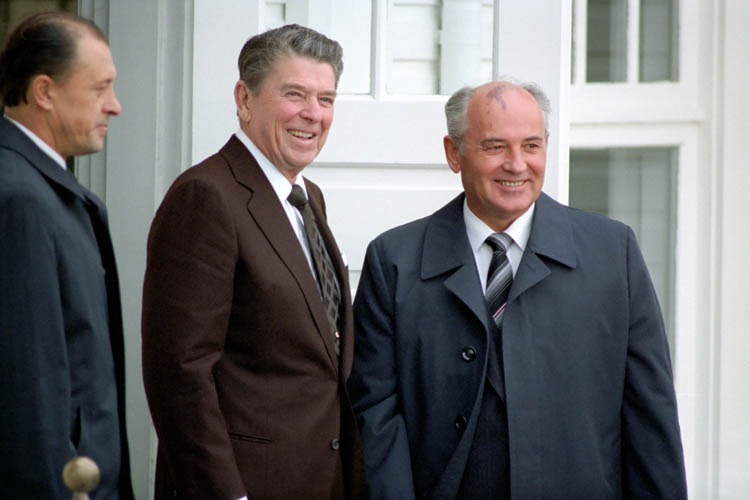
US President Ronald Reagan and Soviet General Secretary Mikhail Gorbachev at the Hofdi House in Reykjavik, Iceland during the Reyjavik Summit in 1986.
Official US government photograph via Wikimedia Commons.
Perestroika‘s what happens when you turn the reins over to the third generation — the generation that didn’t come up hard, and thus wasn’t forced to deal with objective reality. For all his faults, and for all the debate over whether Stalin was “really” a Communist (hint: he was), the Boss knew what it takes to hold onto power in a one-party state. He learned his craft in the hardest school — maneuvering against Lenin and Trotsky, two of the coldest, most ruthless sons-of-bitches ever to draw breath. His successor, Nikita Khrushchev, survived both the Great Purge and the Great Patriotic War for the Motherland — an achievement, as you can imagine, that pretty much no one else of consequence could boast.
Mikhail Gorbachev, by contrast, was born in 1931. His childhood was affected by the war — as was every Russian child’s — but his grandfather was a kolkhoznik from way back; Mikhail was wired in to the Party from birth. Stalin died in 1953. Gorbachev was 22 — in an earlier generation he could’ve been a serious player at that age, but the postwar generation didn’t start rising until their 30s, or more usually their 40s. He was still at university when the Boss kicked the bucket; he didn’t start his official political career until 1955, and wasn’t recognized as a bona-fide comer until the late 1960s.
What this meant was that Gorbachev grew up in the kinder, gentler Soviet Union — the one where Khrushchev released a whole bunch of folks from the Gulag and denounced cults of personality. This is not to say that Gorbachev wasn’t a sincere Communist; he was. In fact, that was his problem — he was too sincere. The earlier generations faced the stark choice between hewing to orthodox Marxism, or hanging on to power. They chose the latter, of course, and that’s why Trotsky had to go — he kept on claiming to be the only true Marxist of the bunch (which he was, of course, but that’s a story for another day). Gorbachev, though, got to see Communism “working,” and from this he deduced — not unreasonably for someone who didn’t come up hard — that Communism’s manifest failures were due to not following Marx and Lenin more exactly. Marx and Lenin talked a great game about “openness” (glasnost), “democracy,” and all that “improving the lot of the People” jazz.
So he did all that, the fool, not realizing that Communism “worked,” such as it did, only through repression. Take your foot off The People’s neck enough to let them breathe, by all means — that was Comrade Khrushchev’s great insight — but if you ease off any further, they’ll try to wriggle out … and eventually kill you, their tormentor. Having never seen The People at close range — as everyone in the previous generations had — he couldn’t understand this, and so crashed the system.
October 30, 2019
QotD: Trotskyism
[The word “Trotskyist”] is used so loosely as to include Anarchists, democratic Socialists and even Liberals. I use it here to mean a doctrinaire Marxist whose main motive is hostility to the Stalin regime. Trotskyism can be better studied in obscure pamphlets or in papers like the Socialist Appeal than in the works of Trotsky himself, who was by no means a man of one idea. Although in some places, for instance in the United States, Trotskyism is able to attract a fairly large number of adherents and develop into an organised movement with a petty fuehrer of its own, its inspiration is essentially negative. The Trotskyist is against Stalin just as the Communist is for him, and, like the majority of Communists, he wants not so much to alter the external world as to feel that the battle for prestige is going in his own favour. In each case there is the same obsessive fixation on a single subject, the same inability to form a genuinely rational opinion based on probabilities. The fact that Trotskyists are everywhere a persecuted minority, and that the accusation usually made against them, i.e. of collaborating with the Fascists, is obviously false, creates an impression that Trotskyism is intellectually and morally superior to Communism; but it is doubtful whether there is much difference. The most typical Trotskyists, in any case, are ex-Communists, and no one arrives at Trotskyism except via one of the left-wing movements. No Communist, unless tethered to his party by years of habit, is secure against a sudden lapse into Trotskyism. The opposite process does not seem to happen equally often, though there is no clear reason why it should not.George Orwell, “Notes on Nationalism”, Polemic, 1945-05.
October 22, 2019
QotD: The Soviet contribution to defeating Hitler
Stalin emerged from the second world war as its most successful warlord, head of a nation whose contribution to the destruction of Nazism had won worldwide admiration. Although the leaders of the western states quickly understood the threat posed by the new Soviet Empire to freedom and democracy, many of their citizens did not.
Between 1941 and 1945 so much praise had been heaped upon Uncle Joe, the defenders of Stalingrad, heroic factory workers of the Volga and suchlike, that thereafter it proved a hard task to disabuse many people of their illusions about Mother Russia. They were not wrong in believing that hundreds of thousands of young British and American men were alive in 1945 because Red soldiers had done more than their rightful share of dying.
Any examination of the Bolshevik revolution and its legacy must linger on the Great Patriotic War, because that victory remains the only indisputable and durable achievement the rulers of Russia can boast since 1917, save the invention of some remarkable weapons systems and spacecraft.
Max Hastings, “The centenary of the Russian revolution should be mourned, not celebrated”, The Spectator, 2016-12-10.
October 20, 2019
QotD: Why Orwell wrote Nineteen Eighty-Four
Many thanks for your letter. You ask whether totalitarianism, leader-worship etc. are really on the up-grade and instance the fact that they are not apparently growing in this country and the USA.I must say I believe, or fear, that taking the world as a whole these things are on the increase. Hitler, no doubt, will soon disappear, but only at the expense of strengthening (a) Stalin, (b) the Anglo-American millionaires and (c) all sorts of petty führers of the type of de Gaulle. All the national movements everywhere, even those that originate in resistance to German domination, seem to take non-democratic forms, to group themselves round some superhuman führer (Hitler, Stalin, Salazar, Franco, Gandhi, De Valera are all varying examples) and to adopt the theory that the end justifies the means. Everywhere the world movement seems to be in the direction of centralised economies which can be made to “work” in an economic sense but which are not democratically organised and which tend to establish a caste system. With this go the horrors of emotional nationalism and a tendency to disbelieve in the existence of objective truth because all the facts have to fit in with the words and prophecies of some infallible führer. Already history has in a sense ceased to exist, ie. there is no such thing as a history of our own times which could be universally accepted, and the exact sciences are endangered as soon as military necessity ceases to keep people up to the mark. Hitler can say that the Jews started the war, and if he survives that will become official history. He can’t say that two and two are five, because for the purposes of, say, ballistics they have to make four. But if the sort of world that I am afraid of arrives, a world of two or three great superstates which are unable to conquer one another, two and two could become five if the führer wished it. That, so far as I can see, is the direction in which we are actually moving, though, of course, the process is reversible.
As to the comparative immunity of Britain and the USA. Whatever the pacifists etc. may say, we have not gone totalitarian yet and this is a very hopeful symptom. I believe very deeply, as I explained in my book The Lion and the Unicorn, in the English people and in their capacity to centralise their economy without destroying freedom in doing so. But one must remember that Britain and the USA haven’t been really tried, they haven’t known defeat or severe suffering, and there are some bad symptoms to balance the good ones. To begin with there is the general indifference to the decay of democracy. Do you realise, for instance, that no one in England under 26 now has a vote and that so far as one can see the great mass of people of that age don’t give a damn for this? Secondly there is the fact that the intellectuals are more totalitarian in outlook than the common people. On the whole the English intelligentsia have opposed Hitler, but only at the price of accepting Stalin. Most of them are perfectly ready for dictatorial methods, secret police, systematic falsification of history etc. so long as they feel that it is on “our” side. Indeed the statement that we haven’t a Fascist movement in England largely means that the young, at this moment, look for their führer elsewhere. One can’t be sure that that won’t change, nor can one be sure that the common people won’t think ten years hence as the intellectuals do now. I hope they won’t, I even trust they won’t, but if so it will be at the cost of a struggle. If one simply proclaims that all is for the best and doesn’t point to the sinister symptoms, one is merely helping to bring totalitarianism nearer.
You also ask, if I think the world tendency is towards Fascism, why do I support the war. It is a choice of evils — I fancy nearly every war is that. I know enough of British imperialism not to like it, but I would support it against Nazism or Japanese imperialism, as the lesser evil. Similarly I would support the USSR against Germany because I think the USSR cannot altogether escape its past and retains enough of the original ideas of the Revolution to make it a more hopeful phenomenon than Nazi Germany. I think, and have thought ever since the war began, in 1936 or thereabouts, that our cause is the better, but we have to keep on making it the better, which involves constant criticism.
George Orwell, responding to a letter from Noel Willmett, 1944-05-18.
October 1, 2019
QotD: The Great Patriotic War
Even by the usual standards of historical irony, it remains astonishing that Hitler’s June 1941 invasion of the Soviet Union not only failed to destroy Bolshevism, but instead conferred a new legitimacy on Stalin’s dictatorship, and probably protracted by a generation the existence of his empire. Successful resistance to Hitler was only possible because of the Soviet leader’s industrialisation programme, which had been carried out at appalling human cost.
The Russian people’s 21st-century notion of what they call “the Great Patriotic War” bears little relationship to our own. It ignores Stalin’s 1939-41 pact with Hitler, and the fact that the Luftwaffe planes that bombed London in the Blitz were powered by Russian fuel. President Putin has made unlawful all published mention of the unspeakable cruelties the Soviet regime inflicted on its own citizens — shooting an estimated 300,000 soldiers for alleged desertion or cowardice — in order to prevail. Antony Beevor’s books, and for that matter my own, are nowadays banned because they describe the Red Army’s 1945 campaign of rape and pillage in Germany.
I have argued elsewhere that the ruthlessness of Stalin’s tyranny was essential to contrive the defeat of Hitler’s tyranny; that if the liberation of Europe had proceeded at a pace determined by the US and British armies, we might still stand short of the Elbe.
Max Hastings, “The centenary of the Russian revolution should be mourned, not celebrated”, The Spectator, 2016-12-10.
September 29, 2019
Being a dictator is a stressful vocation
Gustav Jönsson reviews a new book by Professor Frank Dikötter on twentieth-century dictators:
One of the first things to emerge from Professor Frank Dikötter’s eagerly awaited new book How to Be a Dictator is that it is a stressful vocation: there are rivals to assassinate, dissidents to silence, kickbacks to collect, and revolutions to suppress. Quite hard work. Even the most preeminent ones usually meet ignominious ends. Mussolini: summarily shot and strung upside down over a cheering crowd. Hitler: suicide and incineration. Ceausescu: executed outside a toilet block. Or consider the fate of Ethiopia’s Haile Selassie: rumoured to have been murdered on orders of his successor Mengistu Haile Mariam, he was buried underneath the latter’s office desk. Not the most alluring career trajectory, one might say.
Dikötter’s monograph is a study of twentieth century personality cults. He examines eight such cults: those created by Mussolini, Hitler, Stalin, Mao, Kim Il-sung, Duvalier, Ceausescu, and Mengistu. For them, cultism was not mere narcissism, it was what sustained their regimes; foregoing cultism, Dikötter argues, caused swift collapse. Consider Pol Pot and the Khmer Rouge. Cambodians were unsure of Pol Pot’s exact identity for years, even after he had assumed leadership of the country. The Khmer Rouge, meanwhile, was in its initial stages merely called “Angkar” — “The Organisation.” There was no inspiring iconography. There was no ritualised leader worship. There was only dark terror. Dikötter quotes historian Henri Locard: “Failing to induce adulation and submissiveness, the Angkar could only generate hatred.” The Khmer Rouge soon lost its grip on the country. Dikötter makes an obligatory reference: “Even Big Brother, in George Orwell’s 1984, had a face that stared out at people from every street corner.”
Readers of Orwell will remember that INGSOC has no state ideology. There is only what the Party says, which can change from hour to hour. Likewise, Dikötter argues, there was no ideological core to twentieth century dictatorships; there was only the whim of the dictator. Nazism, for example, was not a coherent creed. It contained antisemitism, nationalism, neo-paganism, etc., but its essence was captured in one of its slogans: The Führer is Always Right. That is what the creed amounted to. Indeed, the NSDAP referred to itself simply as “the Hitler movement.” Nazism was synonymous with Hitlerism. Italian Fascism was perhaps even more vacuous. The regime’s slogan was simple: Mussolini is Always Right. Explaining his method of politics, Mussolini said: “We do not believe in dogmatic programmes, in rigid schemes that should contain and defy the changing, uncertain, and complex reality.”
While it is uncontroversial to argue that Nazism and Fascism were without ideology, as Dikötter writes, the “issue is more complicated with communist regimes.” Naturally, Marxism was connected with Stalin, Mao, Ceausescu, Kim, and Mengistu. But Dikötter rightly says that it was Lenin’s revolutionary vanguard, not Marx’s philosophical works, that inspired them. Doctrines can be interpreted in contradictory ways, creating schismatic movements — as shown throughout the history of socialism. In this regard personality cults are far safer because they are substantively empty. Marxist dictators thus subverted Marxism. Engels had said that socialism in one country was impossible, but that is what Stalin’s Soviet Union favoured. Or consider Kim’s North Korea, which in 1972 replaced Marxism with Great Leader Thought. And as Dikötter writes, “Mao read Marx, but turned him on his head by making peasants rather than workers the spearhead of the revolution.” Reading Marx under Marxism, Dikötter says, was highly imprudent: “One was a Stalinist under Stalin, a Maoist under Mao, a Kimist under Kim.” In short, Marxism was whatever the dictator said, and not what Marx had actually written.
September 27, 2019
The Holodomor – the Communists’ Holocaust | BETWEEN 2 WARS I 1932 Part 3 of 4
TimeGhost History
Published 26 Sep 2019What do you get when you combine vigorous grain-tax policies, bad harvests with Stalins fear and animosity for the rural population of Ukraine? A man-created murder famine, designed to kill millions of Ukrainian men, women and children.
Join us on Patreon: https://www.patreon.com/TimeGhostHistory
Subscribe to our World War Two series: https://www.youtube.com/c/worldwartwo…
Hosted by: Indy Neidell
Written by: Indy Neidell and Spartacus Olsson
Directed by: Spartacus Olsson and Astrid Deinhard
Executive Producers: Bodo Rittenauer, Astrid Deinhard, Indy Neidell, Spartacus Olsson
Creative Producer: Joram Appel
Post-Production Director: Wieke Kapteijns
Research by: Naman Habtom and Spartacus Olsson
Edited by: Danliel Weiss
Sound design: Marek KaminskiSources:
– Applebaum, Anne, Red Famine: Stalin’s War on Ukraine (2017).
– Davies, R. W. and Stephen G, “Stalin and the Soviet Famine of 1932-33: A Reply to Ellman”, in: Europe-Asia Studies 58-4 (2006), 625-633, https://www.uio.no/studier/emner/hf/i…
– Lewin, M, “The Immediate Background of Soviet Collectivization,” in: Soviet Studies 17-2 (1965) 162–197.
– Kuromiya, Hiraoki, “Ukraine and Russia in the 1930’s”, in Harvard Ukrainian Studies 18-3/4 (1994) 327–341.
– Marples, David R, “Ethnic Issues in the Famine of 1932-1933 in Ukraine,” in: Europe-Asia Studies 61-3 (2009) 505–518.
– Watstein, Joseph, “The Role of Foreign Trade in Financing Soviet Modernization,” in: The American Journal of Economics and Sociology 29-3 (1970) 305–319.
– Wolowyna et al., “Regional Variations of 1932–1934 Famine Losses in Ukraine”.A TimeGhost chronological documentary produced by OnLion Entertainment GmbH.
From the comments:
TimeGhost History
4 hours ago (edited)
This might have been one of the hardest episodes we have written, both historically and emotionally. Nothing could ever do justice to the millions of men, women and children who suffered, starved and died during this episode of history. Let us never forget them. We acknowledge that this topic is surrounded by many opposing agendas, myths so that talking about it can get emotional. This is why, as should be known by now, will UNDER NO CIRCUMSTANCES tolerate any kind of Stalinist apologism, falsification of known facts, or outright denial of the Holodomor. The sources, which are clearly presented in our video, the description and in this comment, are unequivocal about the events covered in this episode. Anywhere were there is an assumption based on deduction from these facts, we mention it. Keep that in mind when discussing this under the episode. We will moderate any comments that can’t abide to these clear and simple rules.

